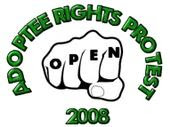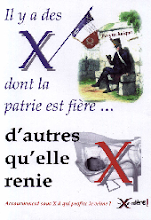

HAMILTON SPECTATOR
August 11, 2008
The search for one's roots
Paul Zadvorny
For weeks at a time, I have sat in Hamilton's Central Library, searching for my resemblance in the black and white pages of old yearbooks. My eyes have tirelessly scanned hundreds of headshots, looking for a girl I imagine has red hair, blue eyes and a smile like my own.
I know my birth mother's face is there, and until new Ontario law comes into effect, Hamilton's Class of '78 is my only hope of solving the riddle of my identity.
Searching for people and information held in sealed adoption records has been a notoriously difficult endeavour for birth parents and for adoptees in Ontario. I am but one of thousands of people throughout the province who have had to endure the indignity of being denied the right to know where we came from.
Last fall we won and lost the chance to know our past when the government passed the Adoption Information Disclosure Act, only to have it immediately stuck down by the courts. The government has now introduced new legislation that corrects its past failure and may finally provide answers, and perhaps closure, to thousands of adoptees like myself.
It's a bizarre sensation knowing that for a short time early in my life, I was someone else. In the few days that I spent with my birth mother, she named me Christopher Paul 'D.' Thanks to the current law, the Catholic Children's Aid can tell me little else about my background. I know my mother's family came to Hamilton from Scotland. They were Catholic, upper-middle class with three children, my mother the eldest. She was 16 and heading into Grade 11 when I was born in September 1976. I know even less about my father -- he was 17 and born to a German family -- and I'm unsure he even knows I exist.
When I was 10 days old, I became Paul Gregory Zadvorny, son to parents every child should have. My parents never hid the fact that I was adopted, and they have always been supportive of my search for my birth mother. But as a kid, and even now, I've hesitated to discuss my adoption with them. I fear that I might upset my mum, or make her feel as though she has somehow become secondary. Consequently, much of what I have done in regard to my search has been on my own -- which at times makes things emotionally difficult.
At an early age, my longing for information was sporadic -- often triggered by family functions and uneasy feelings of not belonging. As a teen I recall curiously digging through my dad's filing cabinets, in search of something, anything, to satisfy my need to know. Finally, lingering amid old receipts and tax forms, I discovered my adoption papers. I remember crying when I read Christopher Paul D. -- it seemed to finally make my adoption real. Still, my discovery gave me a clue and a sliver of hope that one day my search might end, that I would finally find my roots.
With a starting point, I began to explore my options -- immediately finding that they were limited. I requested non-identifying information (where all of the aforementioned details of my former life originated), and added my name to the Adoption Disclosure Registry. After years of waiting for a response, I hit a brick wall. I had exhausted the only active search option provided to adoptees in Ontario.
It became an onerous waiting game. The registry is a list consisting of tens of thousands of adoptees in search of their past, weighted against three provincial employees conducting the searches. A veritable needle in a haystack. Something had to be done.
In April 2005, Community Services Minister Sandra Pupatello introduced a bill that promised to finally give adoptees in this province the right to finally know where they came from. I was ecstatic, and celebrated a moment that I and many others had anticipated for some time. If passed, Bill 187 would allow adoptees over 18 and birth parents to get information that had been sealed, such as birth certificates and adoption orders that would inevitably reveal identities.
Included in the bill was a "contact veto," which was similar to a restraining order where a concerned party could request not to be contacted by his or her birth relative. However, the bill did not have a universal "disclosure veto" provision that would allow a party to stipulate that his or her identifying information not be released.
The bill seemed to address both the wishes of the adoptee and birth parent, and was readily supported by the numerous children's agencies and adoption groups. It would also have brought Ontario in line with Alberta, Newfoundland and British Columbia, the only three provinces to have open adoption records.
In September 2007, the bill was passed. I took comfort that the answers I sought would soon be available. Two days later, Mr. Justice Edward Belobaba of the Ontario Supreme Court struck down the law. The act, he ruled, breached the privacy provisions granted by the Charter of Rights and Freedoms. In an instant, the hopes and efforts of many were simultaneously quashed.
Revised legislation was introduced by the provincial government and became law in May. Its one critical amendment allows either party to apply for a disclosure veto to prevent the release of the adoption records if the adoption was finalized before this Sept. 1.
Adult adoptees and birth parents will be able to apply for copies of original birth registrations and adoption orders starting in June 2009. Disclosure vetoes, by either party, will be accepted by the province starting in September.
I am cautious about getting my hopes up once again, so in the meantime I will continue to scan through yearbooks and make phone calls to strangers hoping to solve my personal mystery.
There seems to be an unspoken bond between mother and child. It is an experience that most people take for granted, and one that I arduously work to attain. It exists between my children and my wife, and between my brother (who's not adopted) and my adoptive mother. The optimistic outcome of my search would be to one day experience that bond.
However, with every idyllic foreshadowing of how my search may end, I have obviously had to consider the contrary. I cannot begin to imagine the emotions and circumstances that my mother faced, and thus have had to empathetically consider things from her perspective. And as difficult as it may be if she chose to remain anonymous, I would respect and accept her decisions.
Still, I continue to hold onto hope that one day my search will come to an end.
It is impossible to predict the results of my efforts, so I have had to prepare myself for whatever the outcome may be -- a harsh reality, softened by the fulfilment of having tried.
Paul Zadvorny lives in Hamilton. zadvorny@hotmail.com
Link to article























